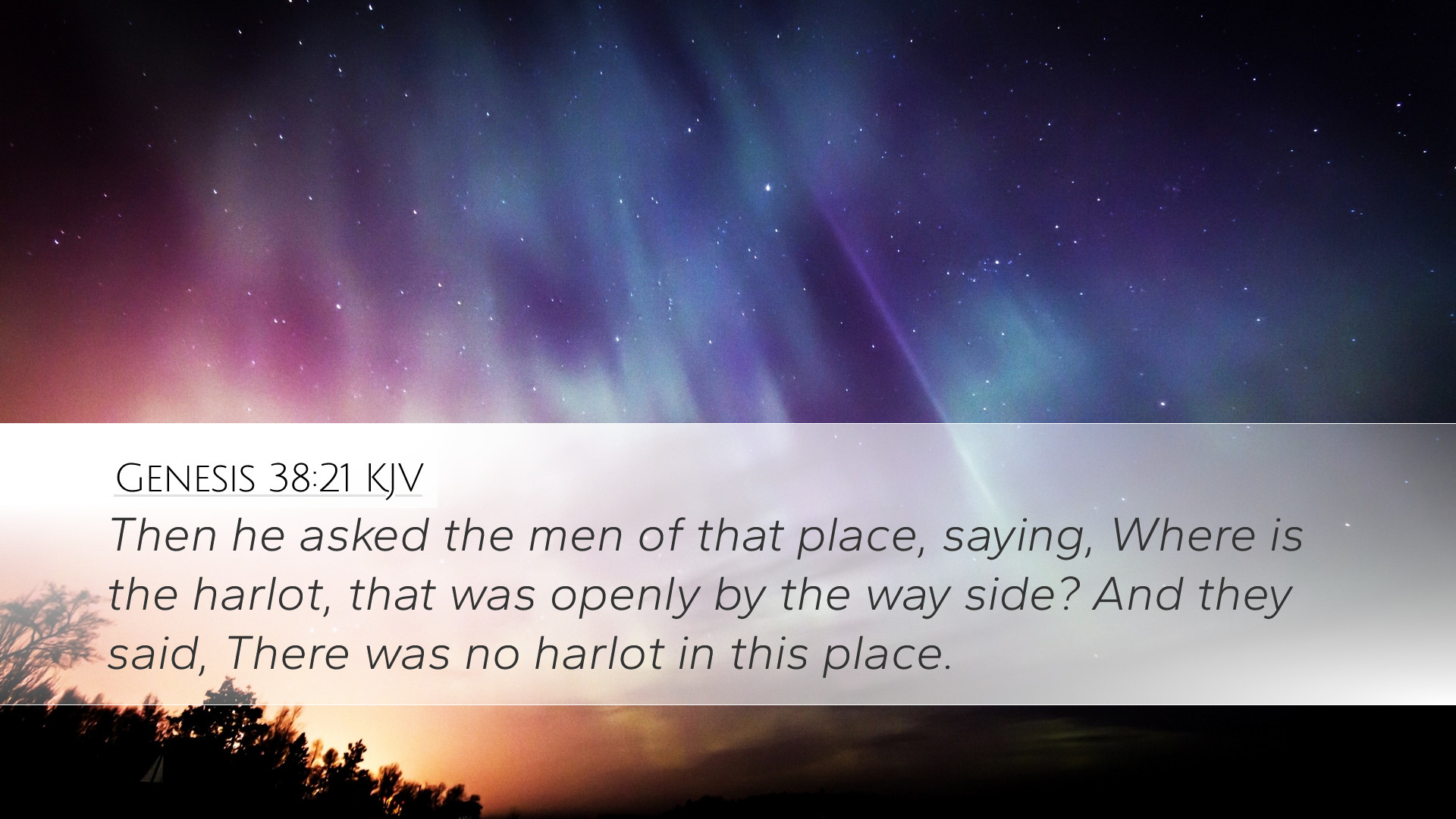Commentary on Genesis 38:21
Verse: "He asked the men of that place, saying, Where is the harlot, that was opened to the way by the road? And they said, There was no harlot in this place." (Genesis 38:21)
Context and Background
This verse is set within the narrative of Judah and Tamar. After Judah's wife dies, he travels to Timnah, where he encounters Tamar, his daughter-in-law, who had disguised herself as a harlot. The focus on the harlotry serves not only to illustrate Judah's moral failings but also to highlight themes of morality, justice, and divine providence.
Insight from Matthew Henry
Matthew Henry emphasizes the moral implications of this encounter. He notes that the quest for the harlot illustrates Judah’s deep-seated issues with lust and moral compromise. His search reflects not just physical pursuits but deeper spiritual neglect.
- Judah’s Choice: Judah's choices led him further from God’s ideal standards. His turn towards harlotry demonstrates a form of idolatry, replacing fidelity with personal gratification.
- Consequences: Henry suggests that Judah's actions would lead to significant consequences, both personally and within the lineage of Israel. This serves as a warning about the repercussions of sin.
Insights from Adam Clarke
Adam Clarke provides a detailed analysis of the social and cultural settings of the time. He elaborates on the significance of a harlot in ancient society and how this reflects upon Judah's societal status.
- Cultural Significance: Clarke points out that harlots were not only socially marginalized but were also a reflection of the moral decline in Judah’s community. Judah’s inquiry reveals a community that may have normalized such behavior.
- Judah’s Ignorance: The fact that the men responded with confusion denotes Judah’s ignorance of prevailing societal norms. Clarke indicates that this ignorance further symbolizes Judah’s spiritual blindness.
Thoughts from Albert Barnes
Albert Barnes offers reflections on the broader implications of this narrative with regard to God's providence. The events in this chapter are not merely incidental but woven into God’s larger tapestry of redemption.
- Divine Oversight: Barnes states that God's hand is evident even in the sinful actions of man. He highlights that through Judah’s indiscretions, God was preparing the way for significant future events related to the lineage of Jesus Christ.
- Character Development: The verse emphasizes a turning point in Judah's character. Through this moment, Judah confronts his failures, which ultimately leads to repentance and restoration.
Theological Implications
Genesis 38:21 serves as a critical reminder of the complexity of human nature and the consequences of sin.
- Sin’s Nature: This passage illustrates how sin can blind individuals to reality, leading them to pursue folly.
- God's Sovereignty: Despite moral failures, it affirms the belief that God's plans are greater than human sin, often bringing good even from dire circumstances.
- Restoration: It sets the stage for discussions on the theme of restoration; how God redeems broken lives and draws sinners back to Himself.
Practical Applications
For contemporary pastors and theologians, there are significant applications derived from this commentary.
- Importance of Moral Integrity: Leaders in the faith community must embody integrity, setting examples counter to the culture and expectations of society.
- Awareness of Consequences: There is a need to educate congregants about the far-reaching impacts of sin on individuals and families.
- Encouragement for Repentance: For those who have strayed, this passage provides hope that repentance can lead to restoration and a deeper relationship with God.
Conclusion
Genesis 38:21, while a seemingly straightforward account, opens up numerous avenues for discussion regarding sin, morality, divine providence, and restoration. By examining this verse through the insights of esteemed commentators like Matthew Henry, Albert Barnes, and Adam Clarke, we find a richer understanding that resonates with the spiritual and practical lives of believers today.


